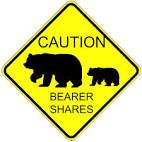If you are a legitimate businessman or investor, your professional adviser, if he or she is honest, will always tell you that owning any assets through a corporation having Bearer Shares can be a fatal mistake. Unless a company's shares are registered, there exists a clear and present danger that ownership can be appropriated by criminal elements, including those very foreign corporation service providers that you engage to assist you. Only if you are a tax evader, or laundering the proceeds of crime, do you really need the level of anonymity that bearer share companies, such as those one can purchase in the BVI, or Panama, can give you; all others should never touch them. Do not let any sharp offshore lawyer tell you otherwise.
We have, over a period of years, told many sad stories, where North American or European investors purchased real estate or other assets, and placed them in a corporation with bearer shares, finding out too late that local "professionals," who were supposedly providing services to them, stole the stock, and thereby the assets, often without even using a forged notary certificate, confirming the "sale" of the stock, though this is often the case. Whoever holds the stock owns the assets, period.
Our extensive coverage of one of the worst of those fraudsters, the Alaskan expat, Gary James Lundgren, detailed how he stole real property that he was supposed to be managing for his foreign clients, in the Republic of Panama. Lundgren, a broker-dealer whose securities licenses were revoked, by FINRA, for the rest of his life, simply transferred the stock of clients into his own name, and thus acquired ownership of the company, and its real estate holdings. You never have total control, unless your corporation issues registered shares.

Clients of Leon Frazer & Associates, Inc., whose professional investment counselor was William Tynkaluk, an LF director, and one of the company's most powerful leaders, were advised that Revenue Canada would soon increase taxes, and that they must transfer their wealth offshore. To do otherwise was folly, according to Tynkaluk, who was neither a tax attorney, nor an accountant. His contacts abroad would form companies for those clients, who were now in fear of losing a substantial portion of their wealth, and those companies would have bearer shares, or privacy reasons, Tynkaluk stated. This was a case of a brokerage firm intentionally giving his clients advice that constituted malpractice, or worse, fraud. LF should never have recommended bearer share companies.

Conveniently, Leon Frazer had a relationship with the ownership of Dundee Corporation, which had an offshore bank in the Cayman Islands, Dundee Merchant Bank, trading as Dundee Bank. LF clients' money would be safe at Dundee Bank. Furthermore, Dundee Bank's two senior bankers, Derek Buntain, President, and Sharon Lexa Lamb, Senior Vice President, would be the directors of your offshore corporations, to assist you, and even be your financial advisers. Can anyone here spell Conflict of Interest ?
We all know what happened next: Lamb & Buntain placed the clients' money, not in segregated accounts, but consolidate the funds and assets in Dundee's own accounts at the Bank of NT Butterfield & Sons, Ltd., and later, without authorization, or right, transferred (read: stole) many millions of client assets, for their own use. This is known as the Cayman Gang of Four scandal.
When victims attempted to take control of their companies back, they found out, to their amazement and chagrin, that Buntain & Lamb would not cooperate, unless they received immunity, and who threatened them with exposure for tax evasion, even if that was not the case. The same financial criminals who stole their money and stock controlled their clients' corporations.
The ultimate insult occurs when the victims seek information about their accounts, at the brokerage firms they dealt with, only to be told that, since they cannot prove that they are directors, or beneficial owners, privacy laws bar the disclosure of that information. Should not Leon Frazer have disclosed that little detail to their clients, in writing, together with all the drawbacks that exist, when a client owns a corporation with bearer shares ? This is negligent conduct, plain and simple.
The lessons to be learned:
(1) Never, never form a corporation that has bearer shares, and do not ever purchase one that does.
(2) Consult a competent lawyer, whenever you need advice regarding corporation formation; you may also need to speak to a tax attorney, as well.
(3) Weigh all the pros and cons, whenever dealing with the offshore industry, and make an educated decision. Sometimes, the best thing to do is to just say no.
Contributed by Kenneth Rijock
Posted by Andrei Slavenkov










